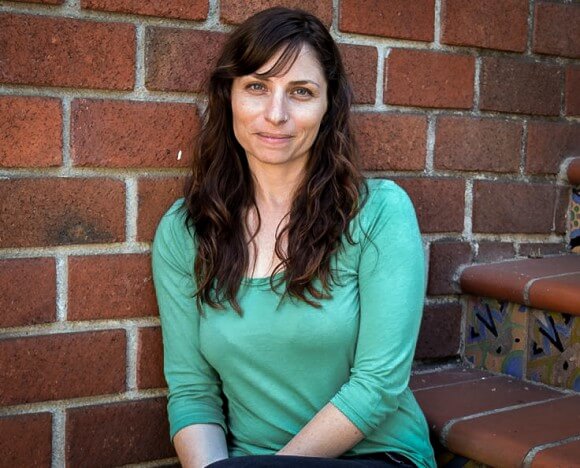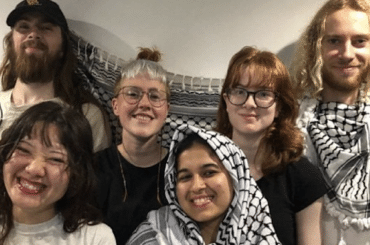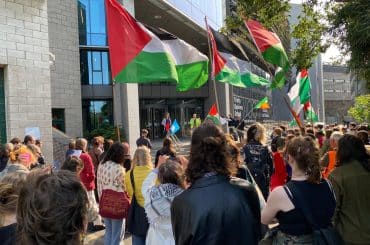
Cover Art
Nora Barrows-Friedman’s In Our Power: U.S. Students Organize for Justice in Palestine , published by Just World Books, is a timely and powerful read, detailing the scope and substance of the Palestine solidarity movement in the United States. Barrows-Friedman situates the movement across both time and space, providing historical and contemporary context to the individual activists whose voices make up the book’s primary content. As a result, In Our Power is at once practical and inspiring for anyone involved in Palestine solidarity or interested in becoming involved.
By privileging student activists and their stories, In Our Power remains true to the very principles of solidarity espoused by the featured activists themselves. As one student activist put it, “solidarity as a concept and a practice really does have to be cause-centric, it really has to center in the needs of Palestinians themselves rather than what those on the outside think needs to happen.” In this vein, In Our Power is not an account of what Barrows-Friedman wishes the movement was, nor is it an exercise in self-indulgent or romanticized nostalgia. Rather, it is an honest portrayal of where the movement has been and where it has the capacity to go. To this effect, the book includes stories of both successes and failures, and carefully details the various challenges – and in some cases the serious repercussions – faced by student and faculty activists.
In identifying the challenges faced by students and faculty who are organizing for Palestine on U.S. campuses, Barrows-Friedman winds up painting what some may consider a fairly bleak picture. But it is how activists have turned their failures or challenges into inspiration and motivation that makes up one of the major themes of In Our Power. Time and again, the interviewees pointed to the increasing pushback against Palestine activism as a sign of the movement’s potential and as a source of renewed energy. Nonetheless, In Our Power offers a sobering look at the enormous amounts of power and money being put to work against Palestine activists. That the movement has continued, and even grown, despite such resistance is perhaps the most inspiring point.

Another theme represented throughout In Our Power is that of solidarity across religious, ethnic and racial boundaries. This solidarity is made clear with the expanding call for Boycott, Divestment, and Sanctions (BDS), likely the most high profile of the tools wielded by Palestine activists, across U.S. campuses. Pro-BDS campaigns have found crucial support from groups such as Latino/a, Black, Native, Asian, Indigenous, and LGBTQ student associations, and even from progressive Jewish organizations. This solidarity is possible because BDS addresses questions relevant beyond the Palestinian context, such as racism, human rights, settler-colonialism, international law, and border policy. In one interview, a national organizing member of Students for Justice in Palestine, remembered the diversity among activists at the 2010 Students for Justice in Palestine conference. “I was so amazed at seeing every background of people there,” she said. “They have no personal connection, but they still feel a connection because maybe they themselves have experienced another struggle and they see the connections between struggles.”
Barrows-Friedman devotes a portion of the book to these connections in a chapter she calls Intersecting Struggles and Common Causes. This chapter touches on the various ways activism has centered around issues such as marginalized communities, institutionalized racism, workers’ rights, and “pink washing”. These vital areas of common struggle are referenced throughout the book, and it is essential these topics are introduced as they represent the diverse spaces within the movement which will surely continue to grow over time. Yet the fascinating history and theory of each, in this chapter, could be expanded upon into an entire book in itself. It left me wanting more detail.
The book concludes with advice from current activists and a look at the various ways these activists define solidarity. The result is an overwhelmingly positive and optimistic tone, leaving the reader both empowered and informed. Even seasoned activists would do well to read this book, as it is not only a source of inspiration, but it takes on the crucial task of placing the individual within a larger context. In Our Power should therefore be required reading for anyone in the world of Palestine activism.
Here’s an excerpt:
Omar Shakir, who graduated from Stanford Law and has begun a Cairo-based fellowship at an international human rights organization, told me that it has become more and more critical to connect Palestine activism to a changing world and to the many other liberation struggles taking place. “When we talk about Palestine, there is still a myth that it’s a thousand-year-old conflict between two peoples who hate each other, and that it’s driven by nationalism ad creed and ancient rivalries,” Shakir said. “But the reality is that it’s a human rights issue. It’s a conflict about land, resources, and human rights, and a system of inequality that deprives people of those rights on the basis of their background. And there are many aspects of the campaign that are similar to other struggles.
For a long time, he added, anti-Palestinian groups have tried to depict the situation as one that is “different” or “too complicated” for most people to understand. He said that these groups would prefer that the situation be pigeon-holed as a toxic issue that no one should touch (unless you subscribe to the Zionist, pro-Israel system of beliefs)…
Just outside of Detoroit, I met Andrew Dalack, a law student at the University of Michigan and a member of the National SJP Organizing Committee. Dalack reflected on the importance of having a national organizing structure behind disparate SJP chapters.
Having this structure, he said, is reassuring to students who are targeted by administrations and outside political organizations. However, Dalack stressed that one of the main challenges that the organization faces is being “meaningfully accountable to Palestinians in the U.S., in Palestine, and abroad.” As the movement is one of solidarity, not one that attempts to dictate political “solutions” or dismiss Palestinian agency, activists like Dalack work hard at understanding and discussing the appropriate role of solidarity activists.



Excellent review of what promises to be one great and necessary book~ you leave me wanting much more!
Kudos to Nora Barrows-Friedman, Just World Books (Helena Cobban & her team), and thank you Samantha!
Thanks for the review. Sounds a very valuable book. I wonder how the Open Hillel folks will see similarities and differences with their work.
Its perhaps too late. Anchluss is coming:
Naomi Wolff reports:
A “revolution” that costs 18 Billion in windfalls for someone’s friends — and the re-orientation of Israel’s entire military might to closer to the edge of Gaza. “At the cabinet meeting, Netanyahu termed the decision “historic,” saying, “We are bringing the IDF training, intelligence, and communications bases to the south. It will cause an enormous revolution in the Negev: international companies are coming to the Negev, an economically strong population is moving to the Negev, and large-scale development is coming to the Negev.” The best kind of source as it is an insider business journal. “‘http://www.globes.co.il/…/article-cabinet-sets-up-company-t…
https://www.facebook.com/naomi.wolf.author/posts/10152973700384476
Wow, via Richard Chisnall. I think it is clear by now what we are seeing folks. Egypt is not Egypt — it is a money-transferring storefront for international investors. Israel is not Israel – -it is a staging ground from which to manage and oversee energy resources. Gaza is not Gaza — it is a parking lot slated to become a global playground for the wealthy and a pipeline thoroughfare. I fear this is the nature of geopolitics going forward, for all of us — nationstates and narratives are just windowdressing.
https://www.facebook.com/naomi.wolf.author/posts/10152974021959476
clarification:
From North Africa through The Middle East and Central Asia into India is 5,000 miles across.
From southern tip of the Arabian Peninsula to the northern point of the Middle East and Central Asia is greater than 1,600 miles.
Why the dark brown faces on the book cover? None of the Palestinians I know look like that.